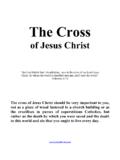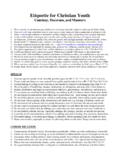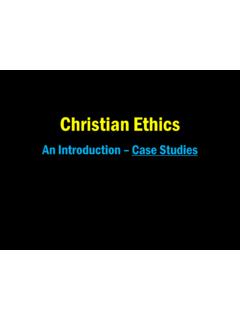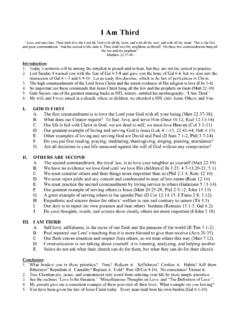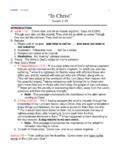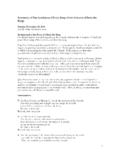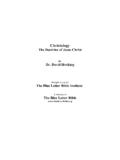Transcription of Growing Up in Christ - Let God be True!
1 Growing Up in Christ Whom we preach, warning every man, and teaching every man in all wisdom; that we may present every man perfect in Christ Jesus: Colossians 1:28 For the perfecting of the saints, for the work of the ministry, for the edifying of the body of Christ : Till we all come in the unity of the faith, and of the knowledge of the Son of God, unto a perfect man, unto the measure of the stature of the fulness of Christ : Ephesians 4:12-13 Introduction: 1. The objective and motive of grace is our perfection as the children of God (Rom 8:29; 12:1-2; II Cor 7:1). 2. Immaturity was a problem in Paul s day, especially with the Corinthians, and he wrote about and against it. 3. We are at the end of another year, which often provokes men to assess and analyze their lives and futures. 4. This sermon will not make anyone mature by itself; but hopefully some hearers will be stirred to grow up!
2 5. Since God chastens His children according to their blessings, we had better make use of our great blessings. I. The Goal A. Jesus grew in wisdom and stature, and in favor with God and men, as we desire (Luke 2:52). B. Paul criticized the Hebrew saints for their immaturity in knowledge and living (Heb 5:12-14). 1. They should have been teachers by the amount they had been taught over a long time. 2. They were immature in knowledge; they were still babes needing milk, rather than meat. 3. Greater knowledge is reserved for the mature (full age), which exercised their senses. 4. Growth and perfection comes by exercising our senses through application of Scripture. 5. There are basics we all should know; there are greater mysteries we could know (6:1-3). C. We should not slide with the world, but rather grow in grace and knowledge (II Pet 3:17-18).
3 D. Be children in malice, who forgive and forget; be men in understanding (I Corinthians 14:20). 1. A young child cannot remember five minutes later why he was mad five minutes earlier! 2. If only adults could learn to live the same way by overlooking the offences of others. E. If any man is in Christ , he is a new creature; he will not return to his old ways (II Cor 5:17). F. The biologically older ones in the congregation should be the living examples of perfection. 1. It is a horrible shame if and when older members are wallowing in any carnal living. 2. The hoary, white or gray, head is a crown of glory, in the way of righteousness (Pr 16:31). 3. Wise children should not exceed our older men, but children should not wait (Eccl 4:13). G. Every man should strive for the wonderful character of Moses assistants (Exodus 18:13-27).
4 H. Every man should strive for the character of Jehoshaphat s judges (II Chronicles 19:5-11). I. Every man should strive for the character of a deacon, or a bishop (Acts 6:1-7; I Tim 3:8-13). J. Paul described the character that ought to describe the aged men and women (Titus 2:1-3). K. Properly trained children don t have to be 25-30 for marriage. How is that wise or prudent? II. The Definition A. Mature. Complete in natural development or growth. Of a person: Having the powers of body and mind fully developed. Of personal qualities, etc.: Fully developed or ripened. Maturity. Of immaterial things: The state of being complete, perfect or ready. B. The aged are generally wiser than the young, but not always, to their shame (Job 32:1-14). C. There are knowledge (doctrinal) babes; there are conduct (practical) babes.
5 Which are you? D. Let us consider a number. How old are you? Biological age + spiritual age = Christian age. E. When we were children, we did childish things; but men must be very different (I Cor 13:11). F. Backsliding is going backward, and not forward, by repeating sins we ve rejected (Pr 14:14). G. Wise men increase in learning and understanding (Pr 1:5; 9:9). They don t stop Growing . H. The greatest sign of maturity, or perfection, is the proper handling of adverse circumstances. 1. Perfection is patient enduring and joyful response to life s trials (Jas 1:2-4; Rom 5:3-5). 2. It is incredibly discouraging to see saints crumbling with some little setback in health, marriage, family, business, finances, friends, etc. And anything is little compared to God! 3. Nothing should move us. We should have total dependence upon, and love for, our God.
6 I. Compare children and their natural conduct with adults and mature conduct for the definition. 1. Children will fight and argue with one another; adults learn to compromise to get along. 2. Children are selfish and only think of getting; adults are selfless and learn to love giving. 3. Children cannot control their emotions; adults learn to rule their spirits and rule emotions. 4. Children pout and punish when they don t get their way; adults learn to overlook hurt. 5. Children are irresponsible and don t take charge; adults know their duties and do them. 6. Children don t like to be corrected; adults appreciate someone perfecting them. 7. Children follow their natural impulses; adults rule their natural impulses and crush them. 8. Children are mesmerized by foolish toys; adults realize their vanity and focus on reality.
7 9. Children envy others for their advantages; adults rejoice in the blessings upon others. 10. Children are only recipients of instruction; adults should be givers of instruction. 11. Children are moody and let others know it; adults crush their moods and hide them. 12. Children cannot take adversity or pain without complaining; adults learn to endure it. 13. Children are filled with foolishness and levity; adults are sober and grave about life. 14. Children never rule their spirits, but let them go; adults learn to never let them go. 15. Children have no initiative to help others unless told; adults look to help as they can. 16. Children blurt out whatever they are thinking; adults learn to hold words (James 3:2). 17. Children fail to look in the mirror or ignore it; adults cover their blemishes (James 1:25). 18. Children have a short-term perspective, about five minutes; adults have a long-term one.
8 19. Children avoid any difficult assignments; adults will do the difficult because it is right. 20. Children imagine fears everywhere, even the dark bedroom; adults have great courage. III. The Obstacles A. The flesh does not want to grow up; the world is getting more foolish; Satan hates growth. B. Personal, petty offences and hurt feelings are a significant mark of immaturity (I Cor 3:1-4). C. Jesus criticized His generation and disciples as faithless and perverse, for they gave up so quickly and had such little faith in the face of adversity and difficulty (Matthew 17:14-21). D. Our spirits are willing, our flesh weak. We must strengthen our spirits and mortify our flesh. E. The Lord is going to bring temptations for His glory, our chastening, and our perfection. 1. We live in a sinful world with sinners; there will be constant pain and disappointment.
9 2. There will be the natural consequences, some long lasting, of our past foolishness and sin. 3. Immaturity is allowing these circumstances to distract, discourage, and then destroy us. 4. There are blessings only for those who learn the lesson, stop sinning, and give Him glory. 5. There are more lessons for the rest, so that they will face greater and greater trouble. 6. Job did so well, for a while; Paul did so well for his whole ministry; what about you? IV. The Means A. Peter gives us a great, inspired summary of how we can grow in godly maturity (I Pet 2:1-3). 1. Starting with the third verse, he asks if the Lord has been gracious enough to motivate us. 2. First, we must end immature activities: malice, guile, hypocrisies, envies, evil speakings. 3. Second, we must desire and devour the milk of Scripture, which is the means of growth.
10 4. Which word you are given every Sunday and every day in between with daily proverbs! 5. How much do you desire and prepare for Sunday s assemblies? The daily proverb? 6. There is enough instruction in Scripture to make the man of God perfect (II Tim 3:16-17). B. Jesus forgives sinners. Period! Wallowing in self-pity, unbelief, and fear is foolish rebellion. 1. Jesus does not care about your past, if you confess it. He only cares about your present. 2. No one is a loser, no matter how sorry their life; we are children of the King of kings! 3. Harlots and publicans, both despised by all men, made up much of the church of Jesus! C. Maturing in doctrine requires review and study; maturing in conduct requires ruling the spirit. D. God inspired Proverbs; Solomon wrote Proverbs; your pastor is expounding them each day. E. The Lord will send trials and temptations to perfect us, so expect them and appreciate them.
